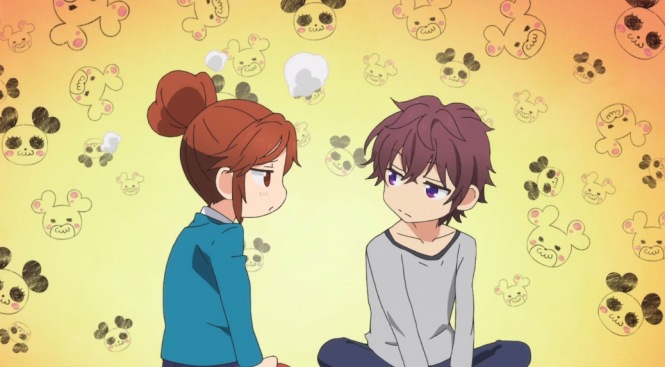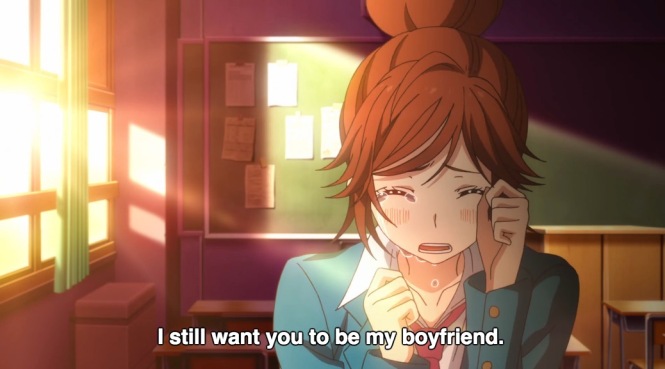You might say… the childhood friend trope is my childhood friend. Maybe.

This is the sixth of my entries into 2017’s rendition of the 12 Days of Anime aniblogger project. For more about the project, read appropriant’s introductory post. Please also check out the spreadsheet containing the work of all the bloggers participating!
The Romance of Non-Romance
In the Honeyworks film, I’ve Always Liked You, the childhood friend doesn’t so much win as carry the day with an overwhelming textual force. It’s as advertised on the tin, a romance from the perspective of a girl who has always liked her crush—her next door neighbor who was one-time childhood playmate and current-day object of affections. Spoilers: They get together at the end. They overcome the fearsome barrier that is the fear-of-what-might-be-lost, and begin to build something rather special in the sunset-streaked wake of the shift. But at the end of the film, the status quo is more or less restored—and thus is the true appeal of the childhood friend trope unveiled.
Childhood friends have been criticized as boring, overly convenient, and lacking in narrative interest. These are all assessments that may be true of individual executions, but fail to grasp the subtle brilliance that lies, intentionally or not, behind it all: the childhood friend romance is a non-romance, because the romantic work has already been done.
The critical paradigm shift between childhood friends—as I’ve Always Liked You makes clear—is not that two people have learned to love each other; rather, it is that two people who already love each other commit to an extension of that love. When Yuu “accepts” (lol) Natsuki’s offer to become her boyfriend, there is a sense of finality. They may very well have gotten married, because their now romantic relationship is not built on some fragile scaffolding of infatuation, but on the solid concrete of friendship.

And the world turns.
Does this make sense? A childhood friendship that becomes a romantic coupling mimics a truer sort love than any fantasy with a glitzy newcomer can, emulating a healthy kind of romance founded on a relationship of deep-seated, habitual mutual care (see: Akagami no Shirayuki-hime) for each other. This is why Yuu’s genuine response to Natsuki’s feelings brings with it both a sense of relief and fails to result in a meaningful change in their daily lives. The film concludes with Natsuki waking Yuu up, just as she has always done—and you get the sense they will continue to do this for the rest of their lives.
In short, this film was pure fanservice for someone like me who is so fond of the childhood friend trope. It takes the usual pining of the childhood friend character, desperately desiring the boy or girl who has eyes of love for them but eyes of romance only for others, and fulfills it in a way that acknowledges the value of the long-standing friendship that resides at the core of the trope. It captures the essence of the true conflict, the agony of uncertainty and the “certainty” of loss should the affection go unreciprocated when voiced. In short, the childhood friend may be convenient as a trope, but when taken seriously it contains more than its fair share of validity.
Oh? What does this have to do with color and discovering my own tastes? Sometimes, if you chase after a trope you’re fond of long enough, you’ll be rewarded with an iteration of it that gives you the potential you’ve always seen in it. From experience, let me say—it’s a pretty good feeling.

A continuation: Are there any “wish-fulfillment” anime tropes that you have a particular affection for that goes beyond their pandering aspects?

I don’t think it is fair to assert that there is more basis for a romance between two childhood friends than between two strangers hitting it off for the first time.
There are a lot of couples who will say that their partner is also their best friend, but that doesn’t always (or even often) mean that they were best friends before they became a couple.
I don’t hate childhood friends. I think that they can be interesting because they occupy this liminal space between friends and lovers, in ways that other dynamics don’t. Seeing childhood friends resolve the conflict within themselves can be satisfying, as you mention. Although personally I prefer to see childhood friend dynamics that don’t explicitly become romantic, because then they tend to lose the liminality that is so special about them.
LikeLiked by 1 person
I’m really speaking only in a narrative sense – when most media does romance, it’s all about the “getting to know you, getting to know all about you” stuff. I like the childhood friend trope because it essentially skips over all of that and makes it history. And I did say it was a “non-romance,” you know! Ditch the romance for something more real, I say (with my tongue in cheek)! In any case, it wasn’t really my intent to say anything about the basis for romance, only to explain a different kind of appeal.
But you’ve sort of got it! In many ways the childhood friend embodies “my lover as best friend” before the lover label has been applied. So it’s kind of like the recontextualization (within the romantic genre) brings out a sort of hidden logic.
I get what you’re saying about the liminality, and I think I touched a bit on that in the post, but in the frame of the trope that liminality is almost always “tension,” as well. I suppose I could only take so much tension watching childhood friend characters in my early days that now I just want the satisfaction all the time!
LikeLiked by 1 person
I’ve always been a huge fan of the childhood trope, I think partially because I’ve have a tumultuous romantic relationship with my own childhood friend. I am often deeply saddened when the childhood friend loses, which is 99% of the time. However, having watched so many childhood friend anime relationships fail, I’ve realized an important element in why the childhood friend often loses out over the other person that the main character has just met. Often times, the childhood friend may represent, as your article astutely points out, a romance already achieved, however they can also represent stagnation. They can be a continuation of comfortable routines which do not challenge us and ask us to become something new or better. It seems to me that, when done right, the new love interest represents more than just a new attractive person, but actually a new possibility of who the main character can become. This person becomes a catalyst to actual change. The childhood friend has a tendency to cement old patterns rather than become a catalyst for change in the main character’s life. In short, they represent the comfort of familiarity, not the excitement of change. This is something I’ve seen in my own life in relation to my own childhood friend. We can end up stuck in our own past. We can fail to challenge each other to genuinely change and more forward. We revert to old habits when we are together. It’s not healthy. Unfortunately, I think that the childhood friend trope in anime offers this same temptation, and thus the new person often “wins” because they become this apocalyptic in breaking of a future which was not previously conceivable, a future which offers a new way of being in the world.
LikeLiked by 2 people
Ah, this is a very interesting idea & I think you hit upon an important point—especially since most of these romances occur between high school students, who ought not to be even close to finishing their personal development. So even at its best, as I argue for the trope here, it’s still something of a fantasy.
Personally, I’d love to see one of these relationships show how a future can grow out of a solid foundation, but that’s probably even more wishful thinking than wanting an impossibly convenient girlfriend who has always loved you haha.
LikeLiked by 1 person
[…] I’ve Always Liked You, Childhood Friends — Isaac examines the deep-seated appeal of the “childhood friends to lovers” trope and, I think, hits the nail on the head […]
LikeLike
Aww, I haven’t seen this, but it looks and sounds really cute.
I have no strong feelings for childhood-friend romances, one way or another. If anything, I’m slightly biased against them, but that doesn’t have anything to do with childhoodfriend romances per se; it’s just that cross-gender friendships are rare in anime, without one part having a crush – and it’s sort of to depressing to see a trend like that.
Nevertheless, there are plenty of cute ones out there, and this one seems to fit bill nicely. Maybe if I come across it…
LikeLike
It is cute, and it’s nice to see a childhood friend have a good time of it instead of suffering forever. I also wish for more cross-gender friendships in anime; in some ways this is the closest you get, and at least when it’s mutual it’s something of a preservation of that.
LikeLike
Great article. You captured the essence of the “romance between childhood friends” trope in a few words. For sure, few choices faced in youth could be harder than that between speaking your love and the alternative of remaining silent and preserving your oldest non-family relationship.
LikeLike